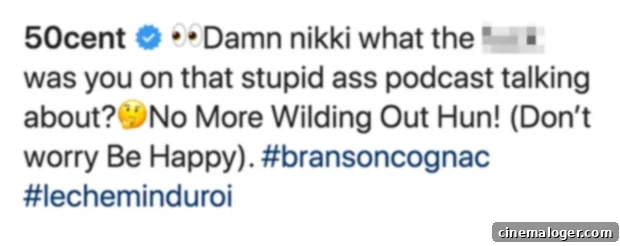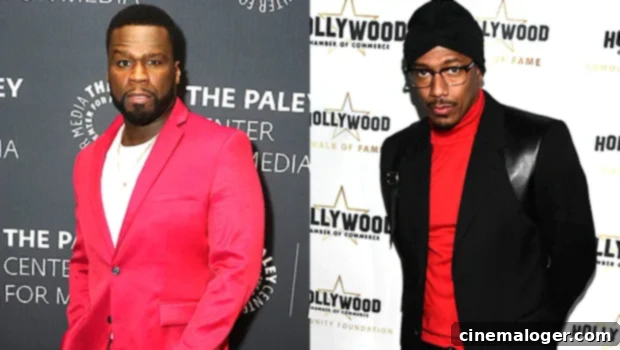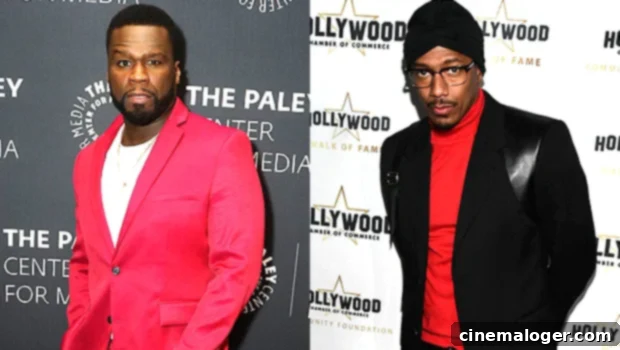50 Cent Blasts Nick Cannon After Wild ‘N Out Firing Over Anti-Semitic Remarks
In a swift and widely publicized reaction, hip-hop mogul 50 Cent, 45, publicly weighed in on the contentious firing of television personality and comedian Nick Cannon, 39, from MTV’s hit improv comedy show, Wild ‘N Out. Cannon’s dismissal by ViacomCBS came after he made controversial anti-Semitic comments during a June episode of his podcast and YouTube series, Cannon’s Class. True to his characteristic outspoken nature, 50 Cent took to Instagram to share his thoughts, delivering a pointed message that quickly garnered significant attention across social media platforms. His post not only amplified the already heated discussion surrounding Cannon’s comments and subsequent career repercussions but also sparked a new wave of debate among fans and fellow celebrities.
The controversy first erupted following an episode of Cannon’s Class where Nick Cannon, while interviewing former Public Enemy member Professor Griff, delved into conspiracy theories about Jewish people, attributing control over the global financial system to them. He also made statements perceived as endorsing Nation of Islam leader Louis Farrakhan, who has a history of making anti-Semitic remarks. These comments quickly circulated online, drawing immediate and strong condemnation from various organizations, advocacy groups, and individuals who deemed them deeply offensive and harmful. The backlash was severe, prompting calls for accountability from ViacomCBS, the parent company of MTV, which had a long-standing relationship with Cannon through shows like Wild ‘N Out and Nickelodeon’s Lip Sync Battle Shorties.
ViacomCBS, facing intense public pressure, acted decisively. On July 14, the media conglomerate announced its decision to terminate its partnership with Nick Cannon due to his failure to apologize for his “anti-Semitic conspiracy theories” and “hateful rhetoric.” A spokesperson for ViacomCBS stated that the company “condemns bigotry of any kind” and has “zero-tolerance for anti-Semitism,” emphasizing their commitment to diversity, inclusion, and safety. This decision marked a significant turning point in Cannon’s career, as he had been a fixture on the network for over a decade, creating and hosting Wild ‘N Out since its inception in 2005, a show that had become a cultural phenomenon and a major source of talent for the comedy world.
It was against this backdrop that 50 Cent, known for his unfiltered commentary on celebrity affairs, entered the conversation. The rapper shared a screenshot of an article announcing Nick Cannon’s firing on his Instagram. Accompanying the image, 50 Cent penned an instantly viral caption that encapsulated his disbelief and disapproval. “👀Damn nikki what the f*ck was you on that stupid ass podcast talking about?🤔No More Wilding Out Hun! (Don’t worry Be Happy).#bransoncognac #lecheminduroi,” the caption read. This message, direct and laced with 50 Cent’s signature blend of humor and bluntness, not only highlighted the severity of Cannon’s misstep but also served as a stark reminder of the rapid consequences public figures face for controversial statements in the digital age. The inclusion of his brand hashtags, #bransoncognac and #lecheminduroi, was also characteristic of his savvy social media engagement, often blending personal commentary with subtle promotion.

The reaction to 50 Cent’s post was immediate and varied, reflecting the polarized opinions surrounding Nick Cannon’s situation. Within hours, the comments section of 50 Cent’s Instagram was flooded with thousands of replies, demonstrating the intense public interest in the matter. Some followers sided with 50 Cent, expressing agreement with his candid critique. “U should be wit Nick on this one,” one follower wrote, acknowledging the controversial nature of Cannon’s remarks. Another user commented, “Thank you 50. We love you forever,” suggesting appreciation for 50 Cent taking a stance against what they perceived as harmful speech. A third supporter wrote, “Thank you for standing up against hate ♥️ stronger together,” aligning 50 Cent’s comment with a broader call for unity against bigotry.
However, not all reactions were supportive. A significant portion of the comments expressed disappointment in 50 Cent, urging him to stand in solidarity with Nick Cannon, particularly given the perceived racial undertones of ViacomCBS’s decision in the eyes of some. “You know what he was talking about! So instead of u making fun of him u should stand with him & the truth!!!! 😒😒 Stand with your ppl not against them 50! 🐑” one critical follower wrote, implying that Cannon’s comments were misunderstood or that 50 Cent should prioritize racial solidarity over public criticism. This division underscored the complexity of the issue, where questions of free speech, accountability, cultural context, and racial identity intersected, creating a contentious public dialogue. The debate extended beyond the specific personalities, touching on broader themes of “cancel culture” and the responsibilities of public figures in an increasingly sensitive social media landscape.
Prior to his firing, and in response to the initial wave of criticism, Nick Cannon had attempted to clarify his position. The former husband of Mariah Carey took to his Twitter account shortly after his controversial comments gained traction, stating, “I do not condone hate speech nor the spread of hateful rhetoric.” This initial statement aimed to distance himself from the accusations of anti-Semitism, though many felt it did not go far enough in directly addressing the specifics of his remarks or offering a clear apology. The backlash continued, escalating until ViacomCBS made its ultimate decision. After the official firing, Cannon issued a more direct and remorseful apology to the Jewish community via a heartfelt Facebook message, acknowledging the pain his words had caused.
In his Facebook apology, Cannon expressed profound regret: “I must apologize to my Jewish Brothers and Sisters for putting them in such a painful position, which was never my intention, but I know this whole situation has hurt many people and together we will make it right,” the message read. This statement was a clearer admission of fault, contrasting with his earlier, more general denial of promoting hate. He also pledged to educate himself further on the history and experiences of the Jewish community, indicating a commitment to personal growth and understanding. This apology, while significant, arrived after the damage to his professional relationship with ViacomCBS had already been done, raising questions about the timing and efficacy of celebrity apologies in high-stakes situations.

However, the narrative did not end with Cannon’s apology. Following his dismissal, he swiftly pivoted to call out ViacomCBS, the company with which he had maintained a working relationship for a decade, demanding an apology from them. Cannon alleged that he had attempted to reach out to the network for a conversation, claiming he “went as far to reach out to [Viacom owner] Shari Redstone to have a conversation of reconciliation.” According to Cannon, these efforts were met with silence, leading him to believe that ViacomCBS’s actions were driven by ulterior motives rather than genuine concern for reconciliation or growth. He further elaborated on his perception of the situation, stating, “That’s when I realized they don’t want a conversation or growth, they wanted to put the young negro in his place.”
Cannon continued his critique, asserting that the company intended to make an example of him. “They wanted to show me who is boss, hang me out to dry and make an example of anyone who says something they don’t agree with.” These powerful accusations painted ViacomCBS as an oppressive entity, quick to exert control over its talent and suppress dissenting voices, particularly from Black creators. Cannon’s defiant stance turned the spotlight onto the power dynamics within the entertainment industry, igniting discussions about corporate responsibility, racial bias in disciplinary actions, and the extent to which media companies should control the public statements of their talent, even outside of direct work commitments.
In response to Nick Cannon’s allegations of attempted outreach and subsequent silence from the company, a ViacomCBS spokesperson issued a statement to HollywoodLife. The spokesperson directly refuted Cannon’s claims, asserting, “It is absolutely untrue that Nick Cannon reached out to the Chair of ViacomCBS.” This direct contradiction from the network aimed to undermine Cannon’s narrative of being ignored and unfairly treated, reinforcing ViacomCBS’s official position on the matter. The conflicting accounts highlighted the breakdown of communication and trust between Cannon and the company, showcasing the complexity of disputes involving high-profile personalities and major media conglomerates. The spokesperson reiterated the company’s commitment to its values and its zero-tolerance policy for hate speech, framing its actions as a necessary response to uphold these principles rather than an act of suppression.
The entire saga—from Nick Cannon’s initial controversial remarks to 50 Cent’s public jibe, the ensuing fan debates, Cannon’s apologies, and his counter-accusations against ViacomCBS—unfolded as a significant moment in celebrity culture and media accountability. It sparked crucial conversations about the power of words, the responsibility of public figures to choose them carefully, and the consequences when those words cause harm. Beyond the immediate impact on Cannon’s career, the incident prompted a wider re-examination of how entertainment companies navigate freedom of speech, cultural sensitivity, and brand image in an increasingly interconnected and opinionated world. The public fallout served as a stark reminder that in the age of social media, celebrity actions and statements are scrutinized like never before, with swift and often irreversible professional ramifications.
